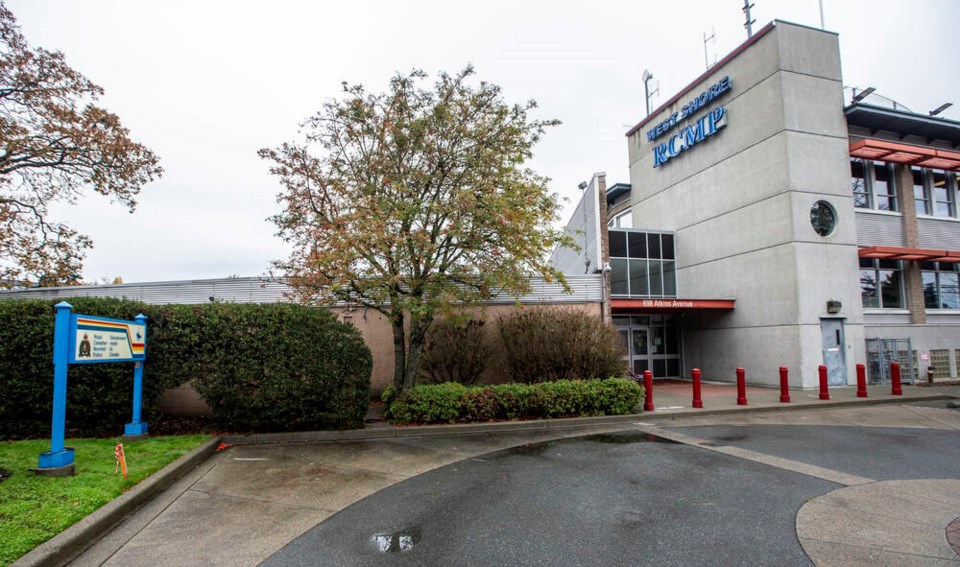Island communities seem to be taking in stride the added costs of RCMP services that have been dumped on them by the federal government, with most saying taxpayers will not feel the financial impact in this year’s budgets.
Island communities that pay for RCMP services say they have been warned for years this cost was coming and have been putting money aside to deal with it.
Laura Mercer, director of finance with the City of Nanaimo, said since 2017 the RCMP has been providing the city with an estimate of what to account for in its financial statements in anticipation of having to pay this bill eventually.
Mercer said Public Safety Canada advised Nanaimo in February last year the estimated settlement value would be $6.04 million.
“This value was higher than what we had in our financial statements by approximately $1.2 million and there was an unanticipated financial impact to the city in 2021,” she said. “Yesterday the city received [an updated invoice] and it totalled approximately $5.8 million. Based on this, the city has accrued more than enough to cover the cost and there will be no financial impact.”
Provincewide, municipalities face paying out as much as $145 million in back-pay for police services rendered since 2017 after Ottawa indicated it would not cover the retroactive contract cost increases associated with the RCMP’s new collective agreement.
After years without a contract, last April the RCMP signed a new collective agreement, which included a $25,000 annual pay raise for sergeants and $20,000 for constables.
A statement from the provincial Ministry of Public Safety and Solicitor General, said the RCMP and the province have been recommending for years that communities set aside funds to cover these costs, though the province has also backed the Union of B.C. Municipalities’ bid to have the federal government cover the retroactive costs of the collective agreement.
In a statement, the federal Department of Finance said given the budget constraints many municipalities might be facing, this week’s budget included a provision that would give municipalities a two-year extension, interest free, to pay their share of retroactive salary costs. “This decision provides payment flexibility to contract policing partners, including municipalities in British Columbia,” it said.
Many municipalities told the Times Colonist Friday that the extension wouldn’t be necessary.
Sidney, which will pay just over $420,000 in retroactive contract costs with the RCMP, had plans in place.
“This cost was anticipated and council was made aware during budgeting in previous years that the town was accounting for it accordingly,” said Mayor Cliff McNeill-Smith.
“There was no impact in this year’s budget which was approved with a 4.57 per cent tax increase.”
North Saanich’s director of financial services, Stephanie Munro, said they were also prepared.
“RCMP have provided estimates for the district’s share of the prior-year retroactive costs and the district has accrued this cost as a liability,” she said. “The liability relating to the estimated retro pay was fully funded through the district’s police contract surplus in the year it was accrued.”
North Saanich faces a retro-pay bill of just over $300,000.
“There is no impact on the 2023 budget resulting from this,” Munro said.
There were similar reactions in North Cowichan, which faces a bill of $1.1 million and Langford, which set funds aside over the last few years.
Not all municipalities will be handed a large bill.
Tofino and other small communities with fewer than 5,000 people pay only a fraction of the cost of RCMP services.
Metchosin, which as of the 2021 census, has just over 5,000 people appears to have been preparing for years to cover its increased policing costs.
According to its annual reports, the small West Shore community has been budgeting just over $1.2 million for its share of policing costs for the last several years by tapping into its police reserve fund.
Metchosin paid only 50 per cent of its policing costs until the new census figures were released. As a community of more than 5,000 it is now on the hook for 70 per cent of its costs.
>>> To comment on this article, write a letter to the editor: [email protected]



